Wider biotech debate on agro-sector challenges can strike usable balance

SCIENTISTS at the Sokoine University of Agriculture (SUA) have expressed commitment to research efforts on biotechnology to better understand the benefits and risks of technology at the local level, asserting that biotechnology is a versatile field.
This involves using biological systems to create products and solve problems, a rather stringent definition as it appears to leverage products from nature to tackle threats often arising from nature, like pests.
Biotechnology uses organic products, not all of what is available in technology, and this outlook appears to be gaining popularity.
There was a weekend panel discussion at an annual meeting of the Crop Science Association of Tanzania (CROSAT) in our commercial capital, where the discussion had biotechnology researchers from Tanzania, Belgium and Kenya.
These were examining organic technology openings in crop improvement and the wider perspectives on these methods.
Commercially, this is a rich field as many markets abroad are averse first to pesticides and then to genetic modification, both excluded at the panel event.
SUA aspires to be a centre of excellence for biotechnology research, opening large flows of research funds into vast areas where it is applicable, but this perspective loses focus on the urgency of certain issues.
Biotechnology is vital for export markets as they receive crops from farms whose technology methods they approve. An example relates to horticulture, where pesticide use is more or less out of the question. But if one comes to address challenges like stunting and malnutrition, issues are altered.
There is a clear policy imbalance leading to a skewed scenario in professional and ultimately public perception on the issues. It is that those seeking research funds know what sort of ideas will get that backing – and they have a strong export lobby to back them up.
However, those who could alter the protein or vitamin content of crops in a rapid manner are seen as businesspeople, selling ‘genetic seeds’ to dominate the market. Environment lobbies work to preserve local seeds, and hence local stunting?
This situation reflects the typical pyramidal structure of public sector dominance and the dependency mentality, where most public entities take the cue from state inclinations – which has to do with aid groups and their prerogatives.
So, there is no explicit policy to address stunting as it needs improved seeds where the lack of animal protein on a routine basis will not do as much harm. In this funding mindset, public agencies educate people on balanced diets while literally banning modified seeds.
An academic administrator at the panel asserted that the rather slow adoption of biotechnology in Tanzania and many other African countries stemmed from perennial misunderstandings of technology.
The academic authority pleaded for the scrapping of draconian controls restricting local researchers from fully participating in biotechnology research and development.
There was a lot of truism in the remark, but it sort of mixed up genetic modification with the harmless organic research they are pursuing – which can boost exports in ten years but just can’t end stunting.
Top Headlines
© 2024 IPPMEDIA.COM. ALL RIGHTS RESERVED

















